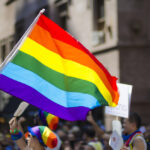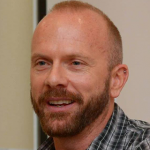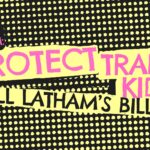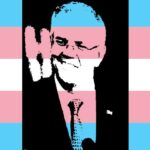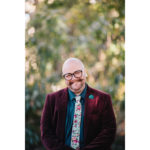Talking Queer Feminist Rights With Delhi’s Nazariya Foundation
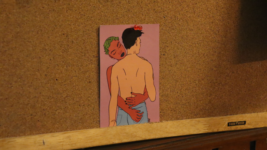
After the parents of California resident Shivy Bhat learnt that their 19-year-old teenager was a trans man, they flew him to their hometown of Agra in India, confiscated his documents and electronic devices, and kept him under house arrest in some sort of effort to counter his gender.
Shivy eventually found a way to communicate with the outside world, and got in contact with South Delhi’s Nazariya Foundation, a queer feminist organisation, with a focus on queer women and trans* persons of all spectrums, that was able to help him in accessing legal assistance, which ultimately saw Delhi High Court rule he should be released.
But whilst this case is extreme, Nazariya has heard from hundreds of LGBTQ young people experiencing similar such house confinement situations, or at times being the subject of much more horrific forms of “conversion therapy” in an effort to counter diverse sexualities and genders.
Established in October 2014, Nazariya is a pioneering feminist collective in India, especially as its primary focus is queer women. And so successful has the resource group been that similar setups with less experience from around the nation contact it for assistance in dealing with crisis situations.
Rainbow amendments
But although some families in India continue to react in drastic ways on discovering their child isn’t heterosexual or cisgendered, attitudes in the South Asian nation are certainly changing to this once hidden issue, and this has especially been reflected in law.
The legal reform that globally revealed that India is shifting away from its tyrannical approach to LGBTQ individuals was the Delhi High Court’s decision to decriminalise adult gay sex in September 2018 by removing it from section 377 of the Indian Penal Code, which was a British-imposed law.
The staff at Nazariya, however, point out that there have been much more significant but lesser-known legal decisions over recent years in this regard.
One of which was the 2014 NALSA decision that saw the Supreme Court recognise a third gender, or those who neither identify as male or female.
And then there’s the Transgender Persons (Protection of Rights) Bill 2019, which established antidiscrimination protections for trans people, and upheld their rights in relation to housing, employment, education and healthcare.
A queer feminist organisation
The Nazariya Foundation runs a resource centre and queer space for queer women and trans* persons of all spectrums people in an office in South Delhi, which runs a phone helpline that provides crisis intervention and mental health support.
And the Nazariya team does not confine its operations to assisting those who’ve fallen foul of prejudicial attitudes and antiquated practices, but it’s also involved in the provision of awareness raising forums at various institutions aimed at countering unfounded bias.
Sydney Criminal Lawyers spoke to the Nazariya Foundation’s Aabha Joshi and Varsha Verma about some of the extreme reactions families in India can have on learning that their child is of a diverse sexuality or gender, and the fact that most violence experienced by LGBTIQ people is family-based.
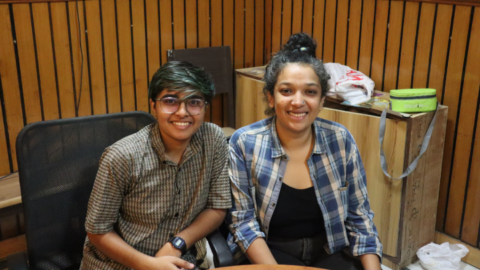
The Nazariya Foundation is a queer feminist organisation, with a focus on queer women and trans* persons of all spectrums.
So, broadly speaking, how would you describe what your organisation does?
Varsha: We work for queer women and trans* persons: trans people of all spectrums.
We provide training for corporates, schools, colleges and other organisations, like feminist organisations, who want to know about the LGBTQ community. And we also provide course training for the prevention of sexual harassment.
We run a helpline – 10 to 6 Monday to Friday – to deal with any query or crisis related to the LGBTQ community.
But the helpline is for all the spectrum: LGBTQ. We were initially focused on women in crisis but if the crisis is of a gay person, we also help them.
How much of a need is there for an organisation like Nazariya in Delhi?
Aabha: There is a huge need. In Delhi, there are some other organisations working on issues. There are a lot of feminist organisations, but there are very few queer feminist organisations that work on issues of gender and sexuality.
There is definitely a need for an organisation that works on issues of gender, because what happens a lot of the time is the discourse about gender in the nongovernment sector is quite restricted to feminist organisations or experiences of men. It is like this binary thing.
But a lot of the gender issues that people in India are facing and that are talked about are not about queer aspects.
There is a need for that space to move so that more queer and transgender people can come and organise themselves or be a part of an organisation like this.
So, this is also a resource centre for the people of the community.
Varsha: There is a need in Delhi for queer organisations to work because we handle crisis cases from all over India, like Bangalore, Haryana and Punjab. Recently, we got a case from Panipat, Haryana.
Most other organisations around India who are working with trans* persons refer us for cases of crisis intervention, because they don’t have the knowledge around handling crisis cases.
They can provide resources, but with crisis cases, they’re not able to handle them as of now.
So, you’re looking at the whole country?
Varsha: Yeah.
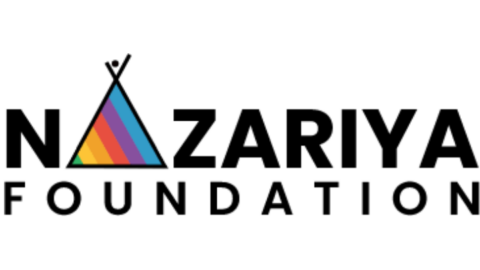
LGBTIQA+ people face discrimination the world over. India has had a reputation for being homophobic and transphobic.
However, over recent years, I’ve seen social media posts with crowds out openly celebrating the Delhi Queer Pride Festival.
Is this a sign that attitudes are changing in this nation? And if so, how far have they progressed?
Varsha: In the last five to six years, I’ve been seeing a lot of positive judgments coming out.
The Madras High Court has been talking about shelter homes for queer and trans* persons and the inclusion of the LGBTIQ community in the curriculum of schools, and sensitising police and medical staff also.
They’re removing all the terrible terminology from the biological doctrines. And even now, there’s a notification that the National Medical Commission has banned conversion therapy for queer and trans* people. So, there have been a lot of positives.
There has been a change in attitude in the laws.
Conversion therapy is still an issue in Australia as well.
Varsha: Here they go to a priest, and they do some magic.
Aabha: It’s a kind of ritualistic thing.
Varsha: And if it is a gay man, they give them testosterone.
Aabha: They give testosterone shots to gay people.
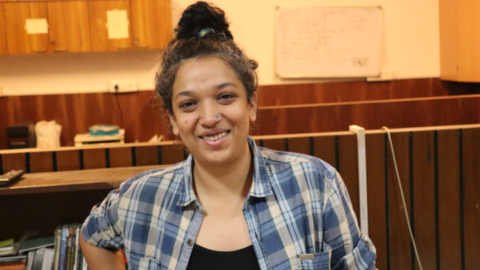
Section 377 of the Indian Penal Code outlaws unnatural sexual acts through threat of life imprisonment or up to 10 years in gaol. And this offence had included adult men having sex with men or women having sex with women.
But in September 2018, the Supreme Court ruled this unconstitutional. So, consensual adult sex between same-sex partners has been decriminalised.
How much of an impact has this reform had?
Varsha: After the judgement of 377, there were a lot of couples, mostly females assigned at birth who are running away from their homes now thinking they can get married.
They don’t understand that they can’t get married. But they’re running away because they have this thought that they can get married now.
Aabha: These are couples from smaller cities or maybe rural parts of the country, who, after 377 was handed down, started having this assumption.
The thing is it was essentially decriminalised, but people are thinking it is legalised now and they can get married.
They think they can get a legitimate marriage recognised by the state, so people are running away from their homes hoping to get married.
Varsha: When a couple comes to us, the first question they ask is, “When can we get married?”
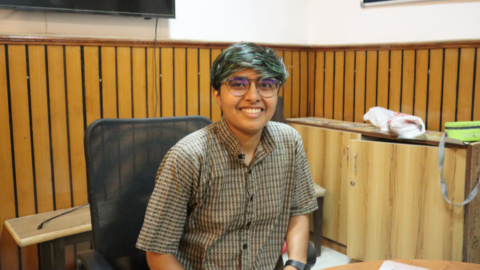
So, what about the issue of same-sex marriage or marriage equality here?
Aabha: After 377, there was a lawyer lesbian couple who have filed to get married.
Do you think same-sex marriage will be legalised?
Varsha: There are a lot of petitions in the Delhi High Court under the Special Marriage Act. I think there are three petitions. But there’s no movement.
Aabha: It might happen. But there are very serious issues that the community faces. Marriage is one entitlement that they could have, but there is a need to understand that entitlements should be holistic.
There are no council reservations for queer people or trans* people who are coming from marginalised backgrounds. So, reservation is an affirmative action that the states have for people who are socially marginalised.
In India, there is the caste system. So, people who are deprived in the caste society are those who are lower in the hierarchy.
So, as per the Constitution, after independence, there were reservations, an affirmative action policy, that were formed for people of the scheduled caste and the Indigenous community. And later on, there were reservations for other poor communities, the OBC, which is slightly above the scheduled caste.
Basically, this affirmative action involves getting a certain percentage of seats reserved for them in public institutions, in education and also in jobs in the public sector.
So, they have access to these jobs, because they are usually deprived and don’t have access to jobs and those resources, so there are these reservations to ensure that there is some kind of entry into institutions.
But when we look at the entitlements that are there for queer and trans* people, there is no space for recognising that there can be queer and trans* people coming from marginalised backgrounds. So, the question is, how do you ensure there is entitlement for them?
Varsha: When we talk about marriage, we feel it is a patriarchal institution. But if marriage gets legalised for queer and trans* people, they will then have a right to fight with their families.
If the constitution is giving us the right to get married, then they can say that they can live together but if the family doesn’t agree with that, the constitution gives them the right to get married, then they can fight from the position that the constitution has provided
Aabha: It will be an entitlement for queer people, because there would be state support, especially for the couples who run away.
Varsha: If there is a couple and one person dies, all their property and money will go to their family, not to their partner. But if they had legal documentation of marriage, then all the property and money would go to the partner.
Why should all the money go to the family that doesn’t support them? These are the benefits we can get from marriage rights.
Aabha: Like in straight marriages, if the husband buys the property, it goes to the wife.
Nazariya is strongly grounded in feminist thought. Indian society has a reputation for treating women oppressively, even violently.
Is the threat of violence heightened for queer women?
Varsha: Yes, in cases when queer women are involved, there are cases of natal family violence. With natal families there are cases of conversion therapy and collective rape
If the parents know about the sexual orientation of the girl, then all relatives from their family rape her.
This is supposed to correct her sexual orientation, because they don’t know how it is to have sex with a man.
Aabha: It happens a lot.
And you’re saying that most of the violence towards queer women comes from their families?
Aabha: Yes, definitely.
Varsha: In the cases of straight women, most of the violence is from intimate partners. But with queer women and trans* people, the cases are of natal family violence. It’s mostly family violence.
Aabha: There are loads of cases of house arrest. When the person is locked up in their room. There was a recent case of a woman who was under arrest.
Varsha: A queer woman was forcefully married. Then when she was not able to stay with the man she was married to, and she went back to her natal family, they house arrested her for three months.
In Australia, trans* people can face violence on the streets. Is that the same here?
Aabha: There was a case recently in the south where two trans women were assaulted by a group of men. There is other violence also.
I was once talking with a friend and a lot of trans* people are doing sex work, so a lot of times when they are doing that work, they experience a lot of violence.
Varsha: The thing is public places sometimes get difficult, because when you go the metro, there are separate lines for men and women
So, for a person like me, I go to the women’s line, and then they stare at me for a few seconds wondering if I am female.
Nazariya runs a number of programs and services for the queer community, including crisis intervention. Can you tell us a bit more about these?
Varsha: In cases of trans* people, it gets difficult for them to survive. If there is a trans man, and the family is forcing them to wear women’s clothes, it gets difficult for them. And then they want to run away.
Then there are the severe cases of collective rape and natal family violence also.
Aabha: We also run a program of counselling centres for queer and trans* people. We have sessions from Monday to Friday and then we have some fulltime counsellors to take these sessions.
In Australia, we continue to have some politicians in office who are openly discriminatory towards LGBTIQ people. Our last prime minister was one of them.
How is the government in this country approaching people of diverse sexualities and genders? And are there laws or programs to assist in reducing prejudices?
Aabha: They don’t talk about it. I’ve never seen any politician talk about these issues, or it’s mostly, female politicians if they do.
Varsha: Recently, the Tran Pperson Protection Act 2019 came out. At that time, they were talking about trans* people. In India, there is some kind of acceptance of trans* people.
There is some kind of acceptance, mostly in the case of trans women.
Like the hijra who are trans women. I was going to ask about how hijras seem to have a special status in Indian society, but at the same time, there is discrimination against LGBTQ people. How does that work?
Aabha: That is the hypocrisy of the society, honestly. For me, the representation of hijras is ritualistic and fictionalised. Just a mere representation is never enough though. Even when we talk about how hijra women are called upon to perform certain kinds of blessings on special occasions.
But the meaning attached to that, when hijra women have to come forward, they basically take all the inauspicious things and omens from a house onto themselves, and then they go.
But I feel like just having a representation is never enough. It has to be a lot more nuanced than just an image, and a lot of people talk about how trans women in India have this progressive or modern position, people use these kinds of terms, especially in international spaces.
I’ve seen Indian people talk about how there is acceptance of this, but you have to understand why there is this acceptance.
The hijra do that work I just described, badhai work, by giving blessings. It is seen as caste work and the work that hijras have to do. They take away all the bad omens from society onto themselves because they’re already cursed. That is the kind of meaning associated with it.
However, that is my perspective. Hijra women will speak about it from a very different perspective.
If they are looking at it from a societal perspective, it is very different. But for hijra women, that is like a token family space. It is their space basically.
And lastly, with attitudes slowly changing in India towards people of diverse sexualities and genders, how do you see things developing from here? Is an increasingly more open society guaranteed or is ongoing struggle likely on the cards?
Aabha: It is an ongoing struggle, especially with the current political climate. Even if there are entitlements for queer and trans* people for recognising their identities, there are a lot of multiple kinds of violence that people see.
There are these multiple kinds of violence and until we address all of them, it is going to be a struggle, and that’s whether or not gender becomes a bigger discourse.
But I also feel like there is a lot of discourse going on, even on social media. When TikTok was a thing in India, before it got banned some time ago, there were a lot of queer and trans* people who were getting very famous, as they had this space to present themselves.
I also see there is a growing discussion around pronouns. People are getting more and more conscious of pronouns.
There is also a lot of resistance, with people who are very sexist and transphobic. But there are also people who are trying to engage with this issue of trans* people.
But I don’t know if there is a way forward. There is a long way to go.
Varsha: There are changes happening. After 377, and the Trans Person Protections Act, they have to hire trans* people. There should not be any discrimination, but I think it is very optimistic that they will hire a trans* person.
Aabha: That is why the workshops that we do at workplaces are very important because for the sake of representation you do have people, but you don’t have the support systems or infrastructure to build within the organisation to support people who are coming from queer and trans communities.
Even for people like me. In my previous workplace, I was not out to anyone – just two friends. I could only be out to a few in an office or else it was going to be very violent for me if I came out at my workplace, because there is no kind of understanding of these issues.
That’s why these workshops are very important in workplaces, especially because we don’t have support at home either.
So, at just 18, we want to run away because from 14 we have been tortured at home, for the way we look, the way we dress, the people we hangout out with, and who we don’t hang out with.
Varsha: We can’t wait until we turn 18. When I receive calls, the first thing I ask them is what is your age. And they say 18 plus.
I’m like, what is 18 plus? And they say 18 and 2 months or 18 years and 3 months. They’re just waiting to turn 18 so they can run away from home.


